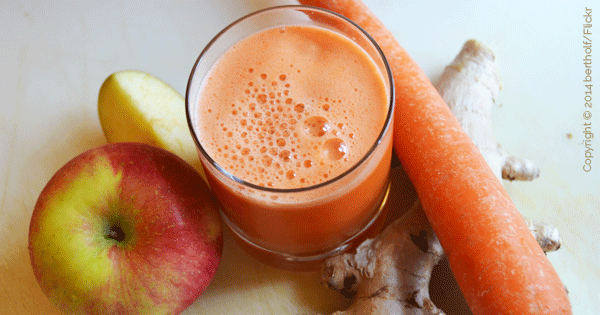Advertisement
With the holidays right around the corner, diets are going to go into full swing sooner rather than later.
Some absurd diets are obviously just weird fads that essentially starve the body of nutrients (only drinking lemon water and celery sticks for a week?). Other diets, however, have such a massive following that it can be hard to get down to the facts.
Thanks to nutritional therapist Theresa Kinsella, MS, RD, CDN who originally spoke to Refinery 29, as well as some fascinating scientific reports, we've busted some diet myths so you can eat better and lose weight faster.
Myth #1: Juicing helps detox your system and helps you lose weight.
The liver and kidneys are the body’s own detoxification system, and they know how to get the job done. These two organs continuously, and efficiently remove waste products and toxins (without the help of juice). Furthermore, juices are simply an inadequate source of protein, fat, essential fatty acids, and especially fiber.
Kinsella went on to say, “These nutrients are crucial for satiety and vital components for a balanced meal. The protein factor is particularly crucial here. When protein intake is inadequate, the body catabolizes protein from muscles and organs. Hence, someone on a juice cleanse could end up losing muscle mass — a major contributor to metabolism.”
This is also why some people might experience such large weight loss (as muscle weighs more than fat). In essence, juicing is actually starving the body of necessary nutrients, regardless of what you're juicing.
That's not to say that juicing during lunch or while you're fasting for a day is particularly bad. Juicing can be beneficial in certain circumstances (ginger juice is amazing for a cold!), but juicing regularly for days at a time is counter-productive.
Myth #2: You should avoid carbohydrates: they make you fat. That is why Gluten-free is good for you.
This is probably the most believed diet myth of all. It started around the time that the South Beach diet came around and announced that all you should eat is protein, fruits, and vegetables, which has gone all the way to the new juicing fad.
According to Kinsella, “The brain alone uses 130 grams of carbohydrates per day. Carbohydrates are also necessary for serotonin production.”
This is not to say that you should be eating a loaf of Wonder Bread a day or that you do not get carbohydrates from vegetables and fruits, but it is especially beneficial to get carbohydrates from complex carbs, like whole grain breads, oatmeal, and granola.
Myth #3: Paleo Diet is the ideal diet because that is what our ancestors ate.
The Paleo Diet is based on eating food that can be hunted, fished, or gathered, such as meat, fish, shellfish, poultry, eggs, veggies, roots, and fruits, like berries. It does not include grains, dairy, beans, salt, and sugar.
However, a big difference between those who follow the Paleo diet and our ancestors? Our ancestors hunted their meals, dragged their kill back to camp, prepared, and cooked it themselves. There is a good chance most people following the Paleo diet do not do all of these things.
According to Dr. Kinsella, “Whole grains, dairy, and beans are nutrient-rich foods. By eliminating them, you could be setting yourself up for a deficiency or eliminating nutrients that help prevent disease.”
In the book “In Defense of Food,” by Michael Pollen, people who had high cholesterol participated in a little experiment where they went off into the woods and lived off the land--similar to their ancestors. They hunted, fished, and gathered all their own food for about a month.
Their diet was rich in fats, carbs, and protein. When they got back, they got a full physical and found that their cholesterol went down and their heart problems had all but disappeared. The key element in this turnaround, however, was that they were away from stress, exercised in order to eat, and slept more: none of which are a part of the Paleo diet.
Myth #4: Fat is bad for you and should be avoided altogether.
Believe it or not, your brain is made up of 60 percent fat. Not only that, but we need fat in order to absorb fat-soluble vitamins (such as vitamin A, E, K, and D); so without any fat, your body will not be able to absorb those vitamins regularly and efficiently.
According to Dr. Kinsella, current research suggests, “the healthiest dietary pattern is that of the Mediterranean culture, which emphasizes foods, [like] fruit, vegetables, beans, whole grains, nuts, and olive oil. Approximately 35 to 40 [percent] of the calories in that diet come from fat.”
That doesn't mean you should run out and grab a Big Mac. You should be attempting to consume fats like mono- and poly-unsaturated fats that are consistent with the Mediterranean diet. These fats are found in foods like fatty fishes (like salmon), avocados, safflower oil, olive oil, nuts, and seeds.
What do you think of these diet myths? Do you find it hard to believe one more than the other? Let us know what you think in the comments!
Copyright © 2014 bertholf/Flickr




